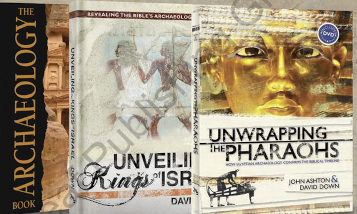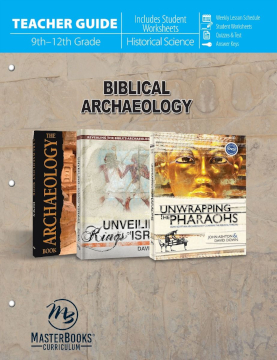Biblical Archaeology is a 246-page teacher guide for three books published by Master Books, which together serve as a two-semester course for high school students. (Credit may be given for history, religion, or an elective.) The three source books are The Archaeology Book, Unveiling the Kings of Israel, and Unwrapping the Pharaohs. The Archaeology Book lays the groundwork for the narrower topics of the other two books on Egyptian pharaohs and Israeli kings.
(See my separate reviews of the three books: The Archaeology Book, Unwrapping the Pharaohs, and Unveiling the Kings of Israel.)
Biblical Archaeology has a course description, suggested daily schedules, worksheets for all three books, quizzes, tests, and answer keys. Lessons should take about 30 to 45 minutes, five days per week.
The course has five objectives:
- Learn about archaeology in the Middle East
- Understand how research supports the accuracy and historicity of the Bible
- Consider an alternate chronology for Egyptian rulers that supports biblical accounts
- Consider evidence for the pharaoh of the Exodus story
- Learn about evidence from archaeology that fills in the unwritten historical record of the Middle East during the period of the Old Testament
The suggested schedules are detailed, showing pages to be read in the books, worksheets to complete, and when to take quizzes and tests. Because the three books are studied in sequence, it would be easy to use Biblical Archaeology to study only one or two of the books if you wish.
 For The Archaeology Book, the worksheets have vocabulary words to define, questions, and activities. For Unwrapping the Pharaohs and Unveiling the Kings of Israel, the worksheets have many questions and a few activities. For all except the first lesson, the worksheets have space for students to write definitions or answers to questions. Activities range widely, including, for example, internet research, writing research reports, mapwork, memorization, timeline work, Bible study, and projects such as brickmaking and working with clay. Students will generally choose from several activities rather than completing all of them, and parents or teachers can help determine which choices are most appropriate.
For The Archaeology Book, the worksheets have vocabulary words to define, questions, and activities. For Unwrapping the Pharaohs and Unveiling the Kings of Israel, the worksheets have many questions and a few activities. For all except the first lesson, the worksheets have space for students to write definitions or answers to questions. Activities range widely, including, for example, internet research, writing research reports, mapwork, memorization, timeline work, Bible study, and projects such as brickmaking and working with clay. Students will generally choose from several activities rather than completing all of them, and parents or teachers can help determine which choices are most appropriate.
Quizzes and tests cover only one book. Each quiz has questions from two to five chapters, and there is one comprehensive test for each book.
This challenging course is best for students already familiar with research and report writing. Students should be able to work independently, but they are likely to enjoy discussing what they are learning with others because some of it is so fascinating.
Biblical Archaeology spends far more time on the Middle East during the biblical era than is normal for history study in high school, and homeschoolers might consider creative ways of granting credit. The teacher guide recommends granting one credit for history, but students might be given partial credit for history, religion, or an elective course.
Summary
Biblical Archaeology’s deep dive into the rulers of Egypt and Israel, set against a broader backdrop that includes surrounding countries, should appeal to Christian students seeking to understand the historical and archaeological support for the accuracy of biblical accounts.









